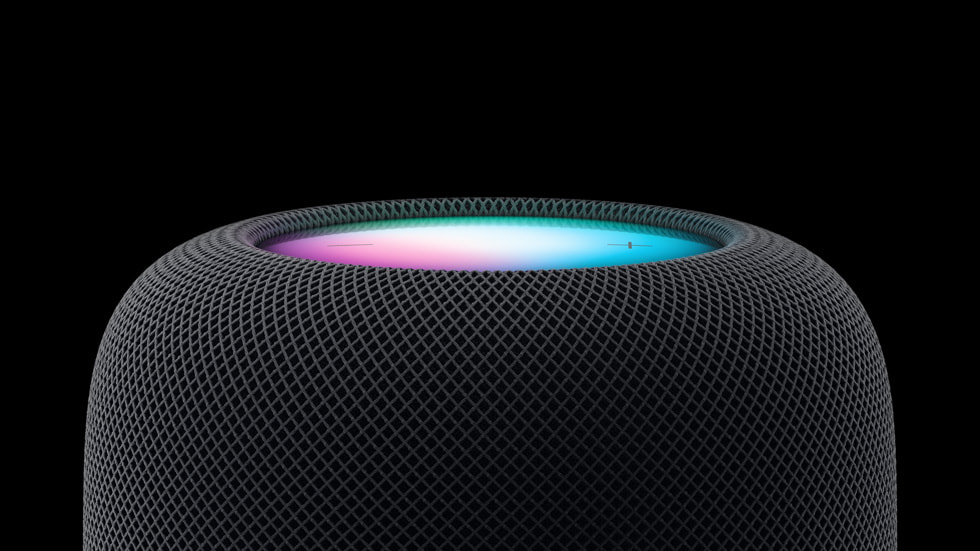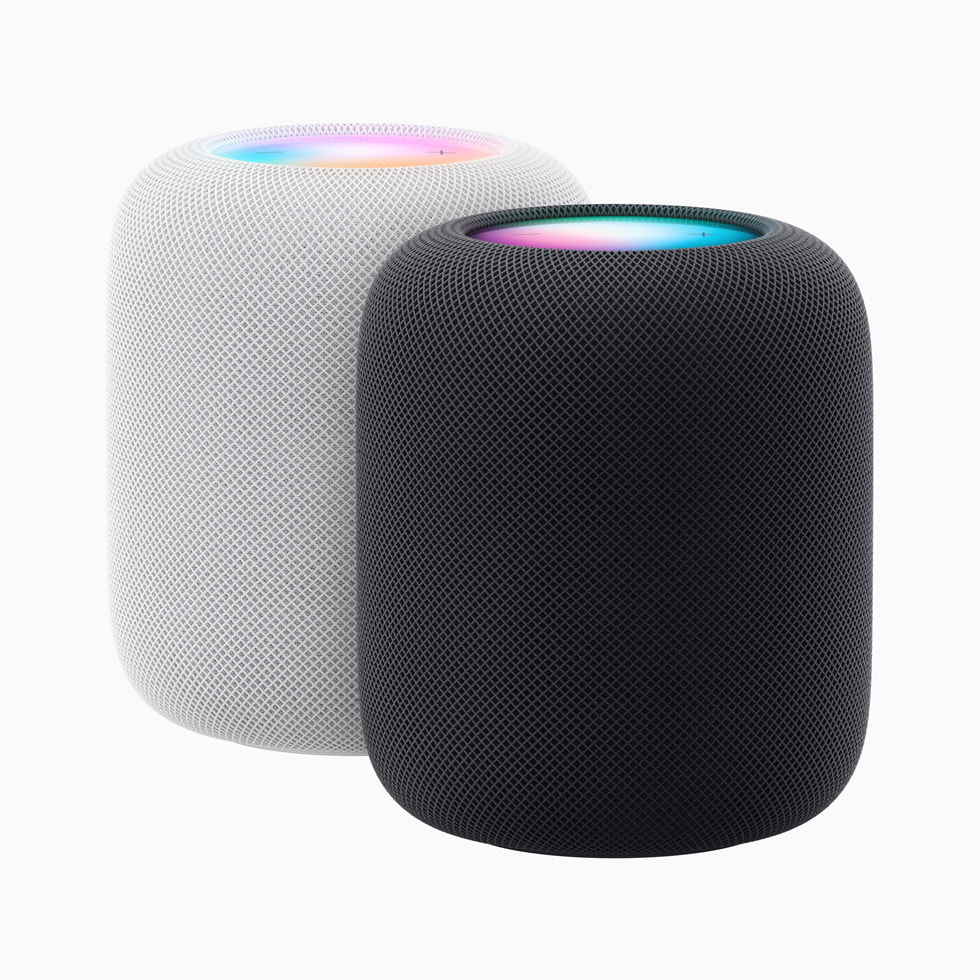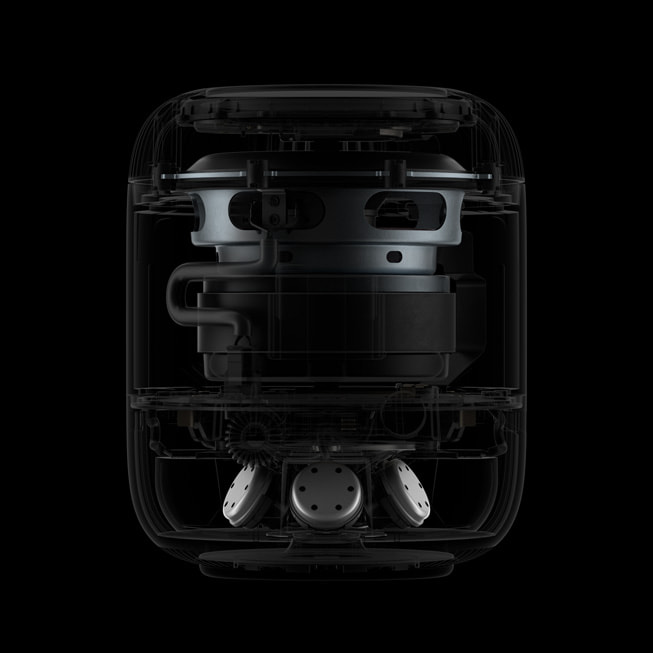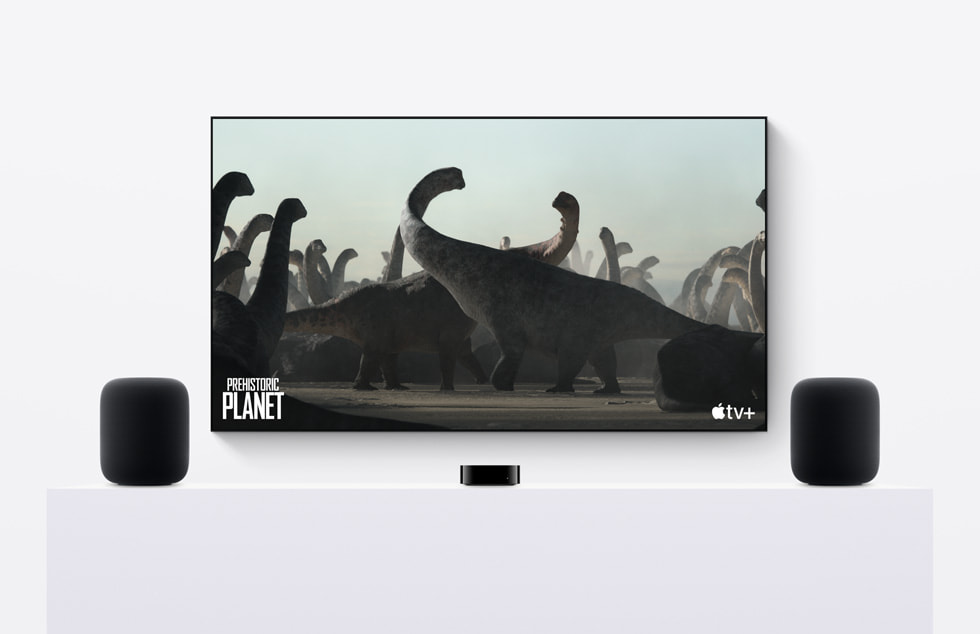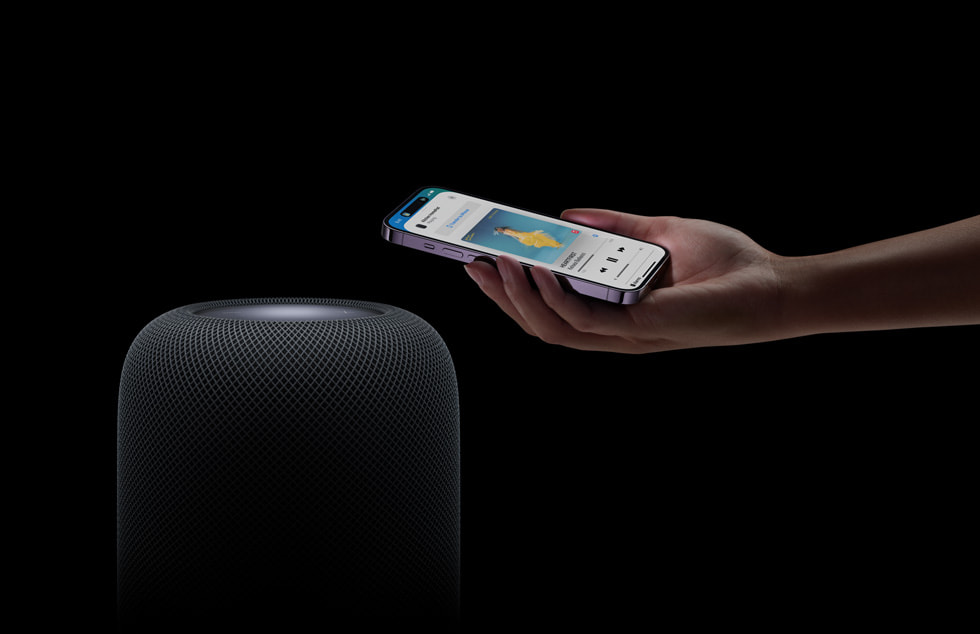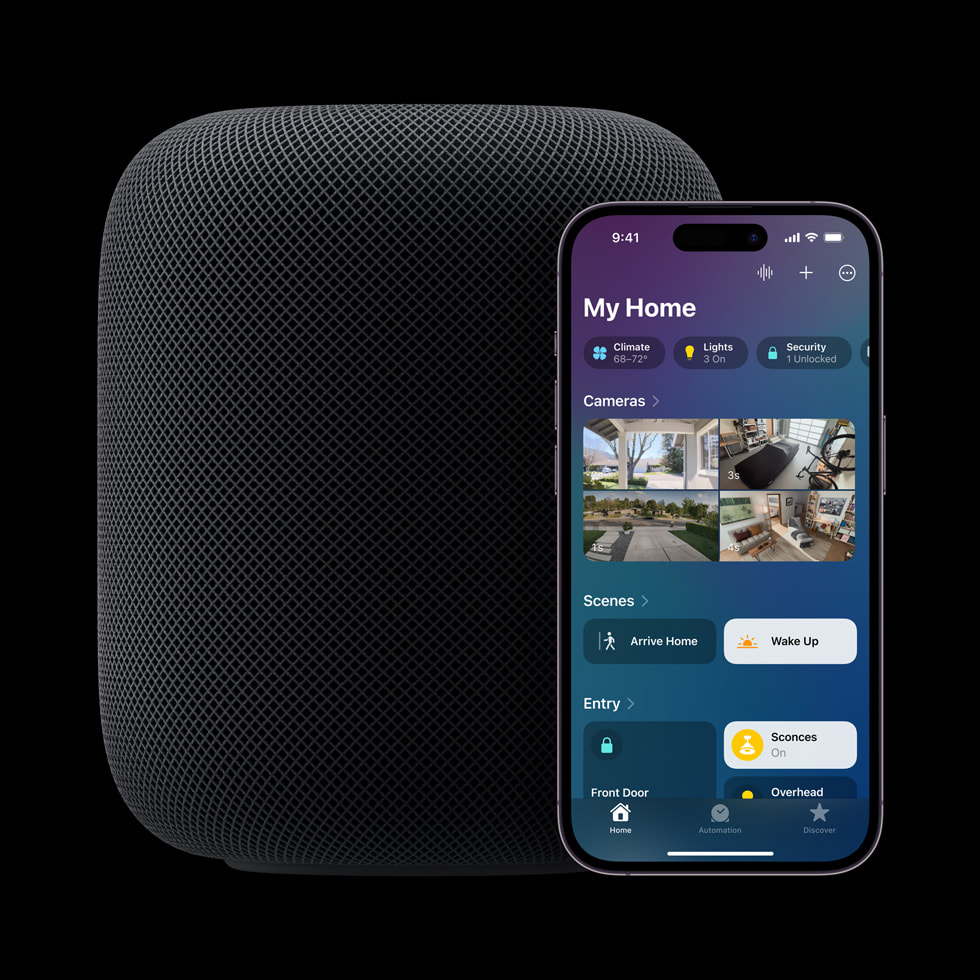PRESS RELEASE
18 January 2023
Apple introduces the new HomePod with breakthrough sound and intelligence
Delivering incredible audio quality, enhanced Siri capabilities, and a safe and secure smart home experience
CUPERTINO, CALIFORNIA Apple today announced HomePod (2nd generation), a powerful smart speaker that delivers next-level acoustics in a gorgeous, iconic design. Packed with Apple innovations and Siri intelligence, HomePod offers advanced computational audio for a groundbreaking listening experience, including support for immersive Spatial Audio tracks. With convenient new ways to manage everyday tasks and control the smart home, users can now create smart home automations using Siri, get notified when a smoke or carbon monoxide alarm is detected in their home, and check temperature and humidity in a room — all hands-free.
The new HomePod is available to order online and in the Apple Store app starting today, with availability beginning Friday, February 3.
“Leveraging our audio expertise and innovations, the new HomePod delivers rich, deep bass, natural mid-range, and clear, detailed highs,” said Greg Joswiak, Apple’s senior vice president of Worldwide Marketing. “With the popularity of HomePod mini, we’ve seen growing interest in even more powerful acoustics achievable in a larger HomePod. We’re thrilled to bring the next generation of HomePod to customers around the world.”
Refined Design
With a seamless, acoustically transparent mesh fabric and a backlit touch surface that illuminates from edge to edge, the new HomePod boasts a beautiful design that complements any space. HomePod is available in white and midnight, a new color made with 100 percent recycled mesh fabric, with a color-matched woven power cable.
Acoustic Powerhouse
HomePod delivers incredible audio quality, with rich, deep bass and stunning high frequencies. A custom-engineered high-excursion woofer, powerful motor that drives the diaphragm a remarkable 20mm, built-in bass-EQ mic, and beamforming array of five tweeters around the base all work together to achieve a powerful acoustic experience. The S7 chip is combined with software and system-sensing technology to offer even more advanced computational audio that maximizes the full potential of its acoustic system for a groundbreaking listening experience.
With room sensing technology, HomePod recognizes sound reflections from nearby surfaces to determine if it is against a wall or freestanding, and then adapts sound in real time. Precise directional control of its beamforming array of five tweeters separates and beams direct and ambient audio, immersing listeners in crystal-clear vocals and rich instrumentation.
Users can listen to a catalog of over 100 million songs with Apple Music,1 enjoy Spatial Audio with a single HomePod or as a stereo pair, or create a captivating home theater experience with Apple TV 4K. With Siri, users can access a range of music knowledge, and search by artist, song, lyrics, decade, genre, mood, or activity.
Elevated Experience with Multiple HomePod Speakers
Two or more HomePod or HomePod mini speakers unlock a variety of powerful features. Using multiroom audio with AirPlay,2 users can simply say “Hey Siri,” or touch and hold the top of HomePod to play the same song on multiple HomePod speakers, play different songs on different HomePod speakers, or even use them as an intercom to broadcast messages to other rooms.
Users can also create a stereo pair with two HomePod speakers in the same space.3 In addition to separating the left and right channels, a stereo pair plays each channel in perfect harmony, creating a wider, more immersive soundstage than traditional stereo speakers for a truly standout listening experience.
Seamless Integration with the Apple Ecosystem
Leveraging Ultra Wideband technology, users can hand off whatever they’re playing on iPhone — like a favorite song, podcast, or even a phone call — directly to a HomePod.4 To easily control what’s playing or receive personalized song and podcast recommendations, anyone in the home can bring an iPhone close to HomePod and suggestions will surface automatically. HomePod can also recognize up to six voices, so each member of the home can hear their personal playlists, ask for reminders, and set calendar events.
HomePod easily pairs with Apple TV 4K for a powerful home theater experience, and eARC (Enhanced Audio Return Channel)5 support on Apple TV 4K enables customers to make HomePod the audio system for all devices connected to the TV. Plus, with Siri on HomePod, users can control what’s playing on their Apple TV hands-free.
Find My on HomePod makes it possible for users to locate their Apple devices, like an iPhone, by playing a sound on the misplaced device. Using Siri, users can also ask for the location of friends or loved ones who share their location via the app.
A Smart Home Essential
With Sound Recognition,6 HomePod can listen for smoke and carbon monoxide alarms, and send a notification directly to the user’s iPhone if a sound is identified. The new built-in temperature and humidity sensor can measure indoor environments, so users can create automations that close the blinds or turn on the fan automatically when a certain temperature is reached in a room.
By activating Siri, customers can control a single device or create scenes like “Good Morning” that put multiple smart home accessories to work at the same time, or set up recurring automations hands-free like “Hey Siri, open the blinds every day at sunrise.”7 A new confirmation tone indicates when a Siri request is made to control an accessory that may not visibly show a change, like a heater, or for accessories located in a different room. Ambient sounds — like ocean, forest, and rain — have also been remastered and are more integrated into the experience, enabling customers to add new sounds to scenes, automations, and alarms.
Users can also intuitively navigate, view, and organize accessories with the redesigned Home app, which offers new categories for climate, lights, and security, enables easy setup and control of the smart home, and includes a new multicamera view.
Matter Support
Matter launched last fall, enabling smart home products to work across ecosystems while maintaining the highest levels of security. Apple is a member of the Connectivity Standards Alliance, which maintains the Matter standard, along with other industry leaders. HomePod connects to and controls Matter-enabled accessories, and serves as an essential home hub, giving users access when away from home.
Customer Data Is Private Property
Protecting customer privacy is one of Apple’s core values. All smart home communications are always end-to-end encrypted so they can’t be read by Apple, including camera recordings with HomeKit Secure Video. When Siri is used, the audio of the request is not stored by default. These features give users peace of mind that their privacy is protected at home.
HomePod and the Environment
HomePod is designed to minimize its environmental impact, and includes 100 percent recycled gold — a first for HomePod — in the plating of multiple printed circuit boards and 100 percent recycled rare earth elements in the speaker magnet. HomePod meets Apple’s high standards for energy efficiency, and is mercury-, BFR-, PVC-, and beryllium-free. Redesigned packaging eliminates the outer plastic wrap, and 96 percent of the packaging is fiber-based, bringing Apple closer to its goal of completely removing plastic from all packaging by 2025.
Today, Apple is carbon neutral for global corporate operations, and by 2030, plans to be 100 percent carbon neutral across the entire manufacturing supply chain and all product life cycles. This means that every Apple device sold, from component manufacturing, assembly, transport, customer use, charging, all the way through recycling and material recovery, will have net-zero climate impact.
Pricing and Availability
- HomePod (2nd generation) is available to order for $299 (US) from apple.com/store and in the Apple Store app in Australia, Canada, China, France, Germany, Italy, Japan, Spain, the UK, the US, and 11 other countries and regions starting today, with availability beginning Friday, February 3.
- HomePod (2nd generation) is compatible with iPhone SE (2nd generation) and later, or iPhone 8 and later running iOS 16.3 or later; or iPad Pro, iPad (5th generation) and later, iPad Air (3rd generation) and later, or iPad mini (5th generation) and later running iPadOS 16.3.
- Customers in the US get 3 percent Daily Cash back when they buy directly from Apple with Apple Card.
- New subscribers can get Apple Music free for six months with the purchase of any HomePod.
Share article
Media
-
Text of this article
-
Images in this article
- Apple Music requires a subscription.
- Multiroom audio requires multiple HomePod speakers or AirPlay-compatible speakers with the latest AirPlay software.
- Creating a HomePod stereo pair requires two of the same model HomePod speakers, such as two HomePod mini, two HomePod (2nd generation), or two HomePod (1st generation).
- iOS 16.3 is required on iPhone for Handoff.
- Home theater with eARC support requires Apple TV 4K (2nd generation) or later, running the latest tvOS software.
- Sound Recognition will be available in a software update later this spring. Sound Recognition may detect smoke and carbon monoxide alarm sounds and send users notifications when recognized. Sound Recognition should not be relied upon in circumstances where users may be harmed or injured, or in high-risk or emergency situations. Sound Recognition requires the updated Home architecture, which will be available as a separate update in the Home app. It requires all Apple devices that access the home to be using the latest software.
- Smart home accessories are sold separately.
